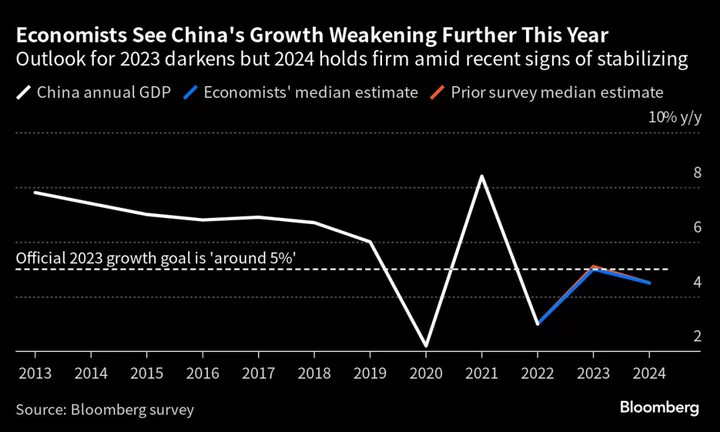Britain’s service-sector companies reported the fastest increase in cost pressures in three months, the latest sign that the Bank of England may have to raise interest rates again.
S&P Global Market Intelligence said its composite UK purchasing manager index for services eased slightly to 53.9 in May from 54.9 in April. That was a slightly sharper slowdown than the reading of 54.6 expected by economists surveyed by Bloomberg.
Figures over 50 indicate expansion, while below that level shows a contraction.
While manufacturers had the fastest drop in input costs in more than seven years, the BOE places more focus on the much larger services sector. Wages increased for services, putting their overall cost burden up at the strongest pace in three months at a time when the BOE expects to see those forces dissipating.
“These survey results are nothing but hawkish in suggesting the Bank of England has more work to do to quash stubbornly high inflationary pressures in the services economy,” Chris Williamson, chief business economist at S&P Global Market Intelligence, said Tuesday.
The central bank raised its benchmark lending rate 12 times since the end of 2021 to bring a halt to double-digit inflation. Investors are betting on another quarter-point hike to 4.75% as soon as next month.
Although S&P’s report showed growth slowing in services and contracting more rapidly in manufacturing, those levels are still generating upward momentum on prices that the central bank wants to choke off.
S&P said services growth reflects strong demand for consumer and financial services. The hospitality industry benefitted from an extra bank holiday to mark the coronation of King Charles III.
“This growth spurt is driving renewed inflationary pressures, as service providers struggle to meet demand and hence not only offer higher wages to attract staff but also find themselves able to charge more for their services,” Williamson said.
The services PMI was little changed at 55.1 in May after a reading of 55.9 in April. Economists had expected the number to come in at 55.3.
Manufacturing shrank more quickly than expected, reading 46.9 this month, down from 47.8 the month before. Economists had expected 48.









